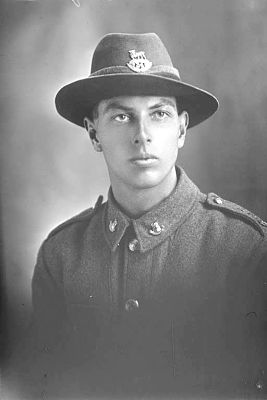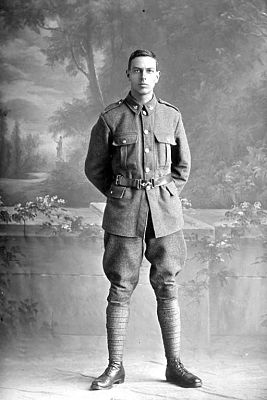WW1 Private Erni Bond 44680
Private Erni Bond was the youngest of five children of the late Mr Erni Bond (1852- 20 December 1914) and of Mrs Alice Bond (nee Freeman, (1858 – 1941)) of 51 Remuera Road, Remuera.
He was born in Wade, near Silverdale on 30 June 1896. His father, also called Erni Bond, was a member of the Remuera School Board and the Remuera Roads Board from 1908 until his death in December 1914. Young Erni attended Remuera Primary School and then Auckland Grammar School from February 1910 to 1913, achieving first prizes for Mathematics and Science in 1912 and 1913 and passing the Public Service Entrance Examination ‘with credit’. He was in the Territorials and attended Auckland University College (now the University of Auckland) passing courses in practical geology, descriptive geometry and elementary surveying in 1916 and qualified for proceeding to the 2nd examination for engineering .
On leaving the Auckland Grammar School, he worked as a surveyor for Mr Roland E. Fry surveyor of Queen Street. He later entered the Civil Service as a cadet in the Lands Office at Auckland, then worked for the Auckland Electric Tramway Company and was engaged on the Company’s extension in Upper Queen Street when he enlisted on 9 November 1916. [1]
Erni enlisted as a Private, and was 20 years old, 5ft 9 inches tall, of dark complexion, blue eyes and brown hair. He sailed from Wellington on the ‘Devon’ on 5 April for Devonport, England and from there for France on 6 July 1917 with the 24th Reinforcements, Auckland Infantry Regiment, A Company.
In Belgium, the Ypres attack on the Passchendaele Ridge began on the 4 October 1917 amid rising optimism at General Head Quarters that a way through the German lines had at last been found. Although the going was difficult — ‘The mud is a worse enemy than the German’, divisional commander Sir Andrew Russell complained — the New Zealand troops secured the spur and consolidated their position, but the attack was costly. Among the New Zealand Division’s 1600 casualties, some 500 men had been killed or mortally wounded including Erni, who died aged 21 on the 4th October 1917 at Ypres. [2] He was posthumously awarded the British War Medal (1921) and the Victory Medal (1923).
Erni is noted in the Auckland Grammar School [3] Chronicle and his name is on the memorial panels in Newmarket, Auckland. He is also commemorated at Tyne Cot Memorial, Tyne Cot Cemetery, Zonnebeke, West-Vlaanderen, Belgium and on the gates of Remuera Primary School.

